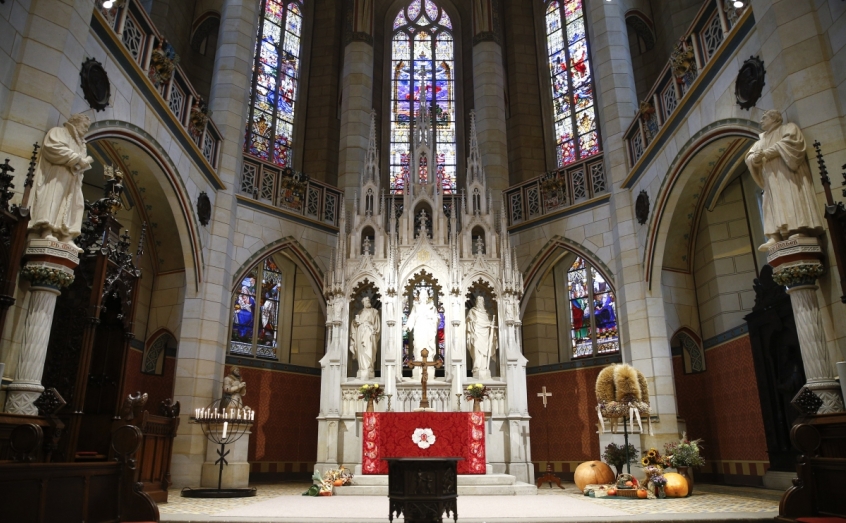
If the Reformation had never happened, what would Western Christianity look like today? That's an obvious question to ask this year, which marks the 500th anniversary of the publication of Luther's Ninety-five Theses on October 17, 1517. What's less obvious is whether Catholics should commemorate it. I won't be.
Naturally, Protestants everywhere will be celebrating the day that they consider to be the true start of their Reformation. That's fine by me, but it's the wrong party for Catholics to crash. Ecumenical functionaries in my church think differently, but their arguments are painfully convoluted: I don't see how dwelling on an event that – from a Catholic perspective – deprived countless millions of Christians of most of the sacraments instituted by Jesus can possibly bring us closer together.
As an exercise in alternative history, however, imagining a Europe without Luther is quite a challenge. Would Christendom have remained overwhelmingly Catholic (or "Roman Catholic", if you insist: it's not what we call ourselves)? Surely not. The church had already been horribly wounded by the Western Schism, during which England supported a pope in Rome and France supported one in Avignon. The dispute was formally resolved in 1417, exactly a century before the publication of the Theses, but it left a papacy that was vulnerable to being pushed around and pulled apart by newly emerging nation states.
It would have happened again, even without theological disputes about the means of salvation and the nature of the Eucharist. So one possible alternative future for Christianity in the West is that it would have come to resemble the church in the East – fractured by rival popes or patriarchs under the control of secular monarchs. Would that have been better, from a Catholic point of view, than what did happen?
Ecumenical etiquette in the West dictates that both Protestants and Catholics pay tribute to the "riches of Orthodoxy"; Anglicans are especially keen on this, though the compliments are rarely returned. The problem is, however, that those riches are so often obscured by Orthodox pandering to temporal power. Many Eastern churches are compromised by nationalism. This has been true of Western churches, too, but not so consistently. Or, to put it another way, Catholics and Protestants operate in more of a free market than Christians in the East, and there is a huge body of data suggesting that internal competition is good for sustaining Christian practice, if not coherent doctrine.
That market in religious ideas is inseparable from technology, and that is the main reason why a Luther-free Europe would not have divided along Orthodox lines. The freedom to question orthodox Christian tradition went hand in hand with the invention of printing and Western modernisation generally. If not Luther, somebody else would have uncorked the bottle.
Everything we know about late-medieval religious dissenters such as the Lollards suggests that, at some point in the 16th century, there would have been an eruption of religious enthusiasm directed against the sacramental priesthood. Where alternative historians can have fun is in speculating how the temporal powers would have reacted. If non-Lutheran Protestantism had been confined to radical sects, lacking the support of princes and city fathers, would Henry VIII have nudged England into the rejection of core Catholic teachings in addition to challenging the authority of the pope?
But enough of this. Self-conscious games of alternative history get boring after a time. What bothers me is the thought that church leaders are constructing a different sort of alternative reality: one that they would like us to substitute for the real thing. Catholics and Protestants (the latter including most Anglicans) disagree fundamentally on the significance of the Eucharist. This is a tragedy that has not been reversed by earnest dialogue: it is a vitally important part of the fabric of Christian life, and the attempts by ecclesiastical bureaucrats to persuade us otherwise misrepresent the convictions of ordinary Christians, perhaps especially in England.
A few months ago, by accident, I stumbled on a Low Church Anglican Eucharist being held by a nice young vicar in an old people's home. After reading a Eucharistic prayer very similar to one that we use in the Mass, he went round offering the residents – many suffering from dementia – a communion wafer. "What's this?" asked one old lady. "Just a bit of bread," replied the vicar.
He meant no disrespect, but any Catholic priest who uttered those words would have been betraying his vocation. And that, in a nutshell, is why I won't be celebrating the 500th anniversary of the Reformation.
Damian Thompson is an associate editor of The Spectator and editorial director of the Catholic Herald. Find him on Twitter @HolySmoke.













